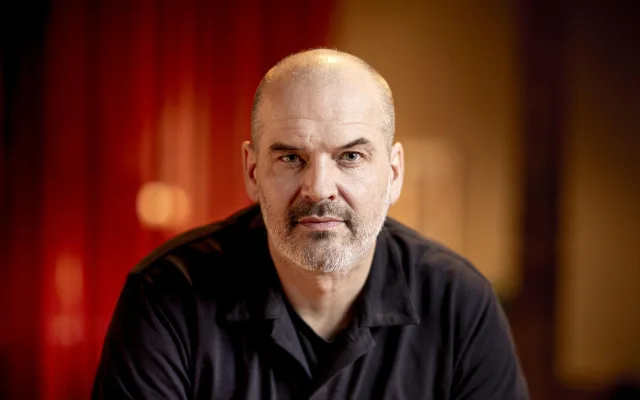
Florian Boesch: “Unique approach to Schubert’s Winterreise”
YES, you read it correctly, Leeds Lieder – pithy, alliterative, euphonious – has been dumbed down to ‘Leeds Song’, lacking all the above epithets and centred on hissy sibilants. We might perhaps have had ‘Leeds Lieder and Song’, tautologous, of course, yet retaining a link to the past.
But the rebranding boys, much on the warpath lately – witness North Yorkshire ditching the white rose – have had their way, no doubt charging for the privilege.
That rant now over, the festival got off to a sensational start with Florian Boesch’s unique approach to Schubert’s Winterreise (not a title that needs translating for anyone who has read this far).
This was operatic monodrama. Forget making every note beautiful in a cosy song-cycle. Boesch delivered the traveller’s unvarnished mental anguish and fluctuating emotions with no holds barred.
‘Good Night’ was quite staccato, with the hint of a smile at the end. It was deceptive. Our traveller was angry at the weather-vane and his lukewarm tears provoked emphatic fury at winter’s ice. Numb with cold, there was no relief to be found in nature until he recalled the linden tree, whose branches rustled a friendly whisper.
The recollection of his beloved’s house rekindled his anger and his mental vacillations continued,on the river. With ‘A Backward Glance’ he was almost shouting his defiance – by this point Boesch was fully inhabiting the traveller’s shoes, rivetingly bound up in the drama even as the will-o’-the-wisp led him astray.
Boesch was weariness personified in ‘Rest’, finding no peace from his pain, but then he became all childish innocence for his springtime dream and there was even jauntiness in his anticipation of something in the post. There were subtle nuances everywhere, a sudden rubato here, a little tenuto there.
After the post horn had ceased, the final ‘Mein Herz’ was fractionally held back, with telling effect. As he transferred his friendship from nature to animals, he darkened his tone for the crow and turned sardonic over the barking dogs. Surviving the savage cold of the stormy morning, he found immediate pleasure in deluding himself.
By now, we were at the nub of the traveller’s loneliness and Boesch conjured a pin-drop moment of deep reflection as he faced the road of no return. Turned away from ‘The Inn’, in reality a cemetery, he brought tears to the eyes, his determination encapsulated by the boldness of the postlude.
That continued through ‘Courage’ and ‘The Phantom Suns’, until the latter ended in a whispered sotto voce. Then all that was left was the organ-grinder, whose lot was never going to improve. Just as our traveller faced an eternity of misery, he had at last found someone to identify with.
The cycle had been a searing experience for singer and audience alike and was followed by a prolonged silence. Middleton stuck bravely to his guns at the piano, caught out slightly once or twice by Boesch’s spontaneity, but it mattered not. They were a splendid team.
Review by Martin Dreyer
The Leeds Song festival continues until April 12. www.leedssong.com.
